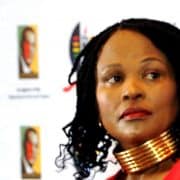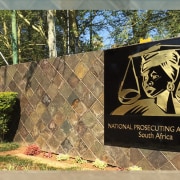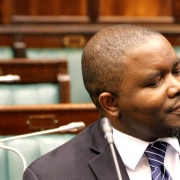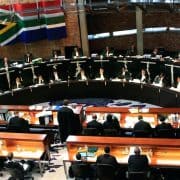|
Getting your Trinity Audio player ready...
|
A negative media image and political scoring at the expense of the credibility of her office are the only challenges keeping Public Protector Busisiwe Mkhwebane awake at night. As for everything else, she has competent staff and the country’s sound legislative framework to guide her office through its tough mandate.
It is with this attitude that she hopes to implement an idealistic outreach programme that will see political and government leadership in all nine provinces open their doors to her, while communities will also get a chance to access her directly. This, she says, is only the beginning.
Mkhwebane gave insight into her first 100 days in office on Thursday at a media briefing. She has been in office since October last year when she took the reins from Thuli Madonsela. The negative media image, she reckons, comes from the unfair expectations placed on her to prove herself against allegations of having worked as a spy by the DA on the one hand and being a puppet of the politically influential Gupta family on the other. Recently EFF leader Julius Malema expressed the party’s regret at endorsing her as a candidate during the selection process in August last year.
“Following a rigorous and transparent process that entailed public nominations and interviews, all but one political party in the committee agreed that I be recommended for the position,” said Mkhwebane. “I’m thankful to the people of South Africa, who, through their representatives in Parliament, showed confidence in me and put my name forward for consideration by the president.”
The one party that she refers to is the DA, which opposed her nomination for the final shortlisting after the interviews of the first shortlisted 12. The party cited her deployment in China for four years as a concern, claiming she was as a spy working for the State Security Agency. Mkhwebane has not only stood her ground, saying she was employed as an immigration officer for Home Affairs, but she also revealed on Thursday that she had given the DA enough time to apologise for the accusation, and with the party having failed to do so, she has opted to take legal action.
Where Mkhwebane wishes to have impact is in communities across the country that would otherwise struggle to access the services of her office. Her countrywide outreach programme – themed Broadening Access: Taking the Public Protector to the grassroots – will start later this month. It takes the form of a roadshow through which she will engage with public service leadership as well as the public.
“I will spend at least two days in each province, engaging with government leaders on the one day and affording the public an opportunity to engage with us on the other,” she explained. “Our first engagements will take place in Gauteng on 16 and 17 February.”
The public protector has met with Minister of Justice Mike Masutha and Co-operative Governance and Traditional Affairs Minister Des van Rooyen to discuss the best ways to implement community engagements in far-flung areas.
To make up for the shortfalls that the 19 offices of the institution cannot meet, Mkhwebane proposed to Masutha the use of Magistrates’ Courts in remote communities as a “quick and more accessible way of expanding the footprint of the services offered by my office.” Masutha has not given the idea the green light yet, as logistical considerations have to be made. “Should the plan succeed, it could potentially spell a breakthrough for social justice.”
With Van Rooyen, Mkhwebane discussed the possibility of a memorandum of understanding that would involve the possible setting up of ombuds offices in district and metropolitan municipalities across the country. She also hopes to make her office’s complaints forms available at municipal offices and service points, for easier access.
Support for the Public Protector’s outreach programme
Corruption Watch supports all efforts by the public protector to increase access to her office, particularly for communities affected by poor service delivery linked to corruption and/or maladministration.
“Active citizenry and public participation is the core of our work, and every effort by different institutions to embark on anti-corruption initiatives in the interest of improving service delivery to the most marginalised communities in the country is supported by us,” said Corruption Watch deputy director Ronald Menoe.
Since the inception of Corruption Watch five years ago, we have noted an increased interest from the public in reporting and combating corruption. “We have in our database over 200 cases from people who had previously reported their matters to the Office of the Public Protector, which tells us that although our communities are eager to uproot corruption as they experience it, the Public Protector alone cannot end the scourge. It is a joint effort which should involve everybody.”
• Image from the Government Communication and Information Service








